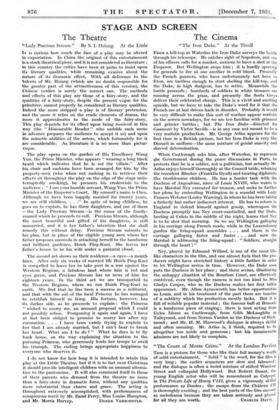"The Iron Duke." At the Tivoli
FROM a hill-top at Waterloo the Iron Duke surveys the battle through his telescope. He catches sight of Napoleon, and one of his officers calls for a musket, anxious to have a. shot at the Emperor. But Wellington stops him ; it is hardly sporting for generals to fire at one another in cold blood. Presently the French gunners, who have unfortunately not been to Eton, are tactless enough to start shelling the hill-top, and the Duke, in high dudgeon, has to retire. Meanwhile the battle proceeds ; hundreds of soldiers in white trousers are running across the grass, and presently the Scots Greys deliver their celebrated charge. This is a vivid and exciting episode, but we have to take the Duke's word for it that the French are at last driven back in disorder. Probably it would be very difficult to make this sort of warfare appear realistic on the screen nowadays, for we are too familiar with grimmer and grimier battles ; but The Iron Duke—directed for Gaumont by Victor Saville—is in any case not meant to be a very realistic production. Mr. George Arliss appears for the first time in a British picture, but his Iron Duke is very like Disraeli in uniform—the same mixture of genial suavity and shrewd determination.
When Castlereagh asks him, after Waterloo, to represent the Government during the peace discussions in Paris, he protests that he is a soldier, not a politician, but actually Mr Arliss enjoys himself thoroughly at the Council table, rebuking the truculent Blucher (Franklin Dyall) and treating diplomats like troublesome children. He has a harder task with the Duchess of Angoulame, niece of Louis XVIII, who wants to have Marshal Ney executed for treason, and seeks to further her plans by embroiling Wellington in a scandal with Lady Frances Webster (Lesley Wareing), in whom he has been taking a fatherly but rather indiscreet interest. He has to return to England to defend himself against gossip, whereupon the Duchess promptly has Ney court-martialled, and the Duke, landing at Calais,in the middle of the night, learns that Ney is to be shot that morning. So we see Wellington galloping in his carriage along French roads, while in the Luxembourg garden the firing-squad assembles . . . and there is the carriage galloping faster and faster . . . and now the Marshal is addressing the firing-squad : " Soldiers, straight through the heart I " Ney, played by Edmund Willard, is one of the most life. like characters in the film, and one almost feels that the pro- ducers might have stretched history .a little farther in order to let Wellington arrive in time. However, the Duke soon puts the Duchess in her place ; and these scenes, illustrating the unhappy situation of the Bourbon Court, are effectively contrived, even though the camera is not too kind to Miss Gladys Cooper, who as the Duchess makes her first talkie appearance. Mr. Allan Aynesworth has better opportunities as Louis,' and in his treatment of the part there are touches of a subtlety which the production mostly lacks. But it is full of reliable popular material ; the famous ball at Brussels is a handsome piece of staging ; there is neat acting from Gyles Isham as Castlereagh, from Gibb McLaughlin as Talleyrand, and from Norma Varden as the Duchess of Rich- mond ; and Mr. H. M. Harwood's dialogue is always skilful and often amusing. Mr. Arliss is, I think, required to be altogether too noble and generous ; but his innumerable admirers are not likely to complain.


















































 Previous page
Previous page